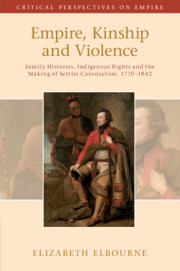‘Elbourne's exploration of settler colonialism at Britain's ‘imperial meridian' is magisterial in scope and execution. Via the sprawling Brant, Bannister and Buxton families, Elbourne expertly connects colonial violence both to economic exploitation and to humanitarian moralising in revolutionary America, the new Antipodean colonies, West Africa and metropolitan Britain.'
Zoë Laidlaw - University of Melbourne
‘This exhaustively researched and elegantly written book provides a new perspective on the genesis of settler colonialism in North America, Australasia and Africa by focusing on the dynamism of three variously implicated families. The Brants, Banisters and Buxtons carved out an intergenerational imperial presence as they participated in the contraction and re-expansion of the British Empire's settler colonies between the 1770s and 1830s. In these days of simplistic and binary contests over the nature and legacies of colonialism, Elbourne's wonderfully nuanced and focused scholarship deserves the widest possible readership.'
Alan Lester - University of Sussex
‘In a brilliantly successful and very well written experiment, Elizabeth Elbourne has combined the global scale of the British Empire, on four continents, with the local of individual families. Through this compositional tour-de-force, she presents innumerable insights into the processes of colonization, for the indigenous, colonizers and their interaction.'
Robert Ross - Leiden University
‘In this exemplary transnational history, Elizabeth Elbourne provides a creative and devastating account of the linkages between family, intimacy and colonial violence in the British Empire. Focusing on the Brant, Bannister, and Buxton families, Elbourne demonstrates the intertwining of humanitarianism and colonialism during the first half of the nineteenth century and offers a model of how an analytic focus on family sheds new light on indigenous and settler histories as well as colonialism itself. Highly recommended.'
Pamela Scully - Emory University
‘[this] stimulating examination of the subject is a useful addition for libraries specializing in British imperial history; borderlands studies; and the history of Indigenous people in North America, Australia, and South Africa. … Recommended.’
M. Klobas
Source: Choice



